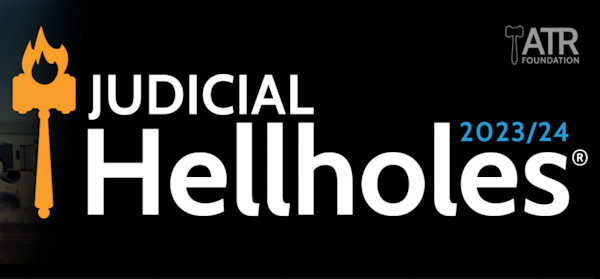'Nuclear verdicts' and 'litigation tourism' are partly why these state courts are top 'judicial hellholes,' report says

Courts in Georgia and Pennsylvania are named as top “judicial hellholes” for their friendliness to tort plaintiffs in a report. Image courtesy of the American Tort Reform Foundation.
Courts in Georgia and Pennsylvania are named as top "judicial hellholes" for their friendliness to tort plaintiffs in a report by the American Tort Reform Foundation.
The report criticized Georgia and Pennsylvania for “nuclear verdicts,” defined as verdicts of $10 million or more, and “litigation tourism,” in which plaintiff-friendly state courts permit lawsuits against out-of-state defendants.
The report named the entire state of Georgia as a “judicial hellhole” but names only the Pennsylvania Supreme Court and the Philadelphia Court of Common Pleas as hellholes in Pennsylvania.
The report said a 2023 U.S. Supreme Court decision greenlighted litigation tourism when it upheld a Pennsylvania law that requires companies to consent to personal jurisdiction in state courts if they register to do business in the state.
The decision, Mallory v. Norfolk Southern Railway Co., upheld the law in a due process challenge but did not address whether the law could stand under a commerce clause theory, the ABA Journal reported in June.
The Georgia Supreme Court reached a similar decision in 2021 that grants expansive jurisdiction over out-of-state defendants, according to the report.
Another negative ruling, the report said, is a November decision on venue by the Pennsylvania Supreme Court that will allow many cases against out-of-state plaintiffs to be heard in plaintiff-friendly courts in Philadelphia.
The court ruled that venue is proper in a county where a company maintains “a constant physical presence,” such as through an authorized dealer selling its products. The decision is Hangey v. Husqvarna Professional Products.
The report also points to nuclear verdicts that include a $1.7 billion damages award in Gwinnett County, Georgia, in 2022 and an award of nearly $1 billion award in Philadelphia in 2023.
In second place on the judicial hellholes list is Cook County, Illinois, followed by California; New York City; South Carolina for consolidated asbestos litigation; Lansing, Michigan; Louisiana; and St. Louis.
Law.com spoke with lawyers who criticized the report.
Alfred Carlson, president of the Philadelphia Trial Lawyers Association, said the report is “an affront to the citizens” of Pennsylvania and the judges and justices they elect.
“The justices and judges are impartial, fair and work extremely hard,” Carlson said.
Evan Holden, a civil defense attorney with Greenberg Traurig’s Atlanta office, told Law.com that he was surprised to see Georgia at the top of the list.
“My group and myself, we practice in federal court and state courts not just in Georgia but throughout the country, so I think we have a unique perspective,” Holden told Law.com. “We feel that Georgia is not a bad place to be as a corporate defendant, let alone number one on this ranking.”
The hellholes list seems to be distorted by “a few runaway verdicts” by juries, he said.
The American Tort Reform Foundation, which issued the report, is the educational arm of the American Tort Reform Association, a nonprofit organization dedicated to reforming the civil justice system.
Reuters also has coverage of the report. How Appealing noted the Law.com coverage.
See also:
“What state is deemed top ‘judicial hellhole’ following $1.7B verdict against Ford Motor Co.?”
Write a letter to the editor, share a story tip or update, or report an error.


